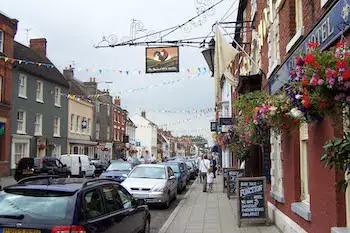A cock and bull story is a fanciful and unbelievable tale.
A cock and bull story
What's the meaning of the phrase 'A cock and bull story'?
What's the origin of the phrase 'A cock and bull story'?
It is widely reported that this phrase originated at Stony Stratford (“The Jewel of Milton Keynes“), Buckinghamshire, England. Visitors to Milton Keynes might feel the bar for ‘jewel’ status is set rather low in that region, although Stony Stratford is indeed a rather pleasant market town.
Stony Stratford, which name derived from ‘the stony ford on the Roman road‘, is located on the old Roman road of Watling Street, now the A5. In the height of the coaching era – the 18th and early 19th centuries – Stony Stratford was an important stopping-off point for mail and passenger coaches travelling between London and the North of England. This coaching history is the source of the supposed origin of the phrase ‘cock and bull story’.
The Cock and the Bull were two of the main coaching inns in the town and the banter and rivalry between groups of travellers is said to have resulted in exaggerated and fanciful stories, which became known as ‘cock and bull stories’. The two hostelries did, and still do, exist.
By now, you may have noticed the ‘widely reported’ and ‘supposed’ adjectives above and picked up that I don’t believe a word of it. It is an appealing story but, regrettably, it is little more than that. There’s no evidence whatsoever to connect the two inns with the phrase, apart from the coincidence of the two names.
Whisper it not in Stony Stratford if you want to get out alive, but it’s more likely that the phrase comes from old folk tales that featured magical animals.
The early 17th century French term ‘coq-a-l’âne’ was glossed in Randle Cotgrave’s A Dictionarie of the French and English Tongues, 1611 as meaning:
An incoherent story, passing from one subject to another.
The literal translation of ‘du coq à l’âne’ is ‘from rooster to jackass’, which nicely fits the meaning of the term. This was later taken up in Scots as “cockalayne”, again with the same meaning.
The first citation of ‘cock and bull’ in English that I know of is from the English dramatist John Day, in the comic play Law-trickes, 1608:
That boy is worth his weight in pearle, dist [do] marke [pay attention to] what a tale of a Cock and a Bull he told my father while I made thee and the rest away.
This reference to ‘a cock’ and ‘a bull’, which is duplicated in all the early 17th and 18th century citations of the phrase, lends support to the view that the stories were about cocks and bulls, that is, fanciful tales, rather than stories told in the Cock or the Bull.
The early date doesn’t entirely rule out the coaching inn story, as coaches were used for transport in England prior to 1621 and both establishments were in business before that date but, in my view, that derivation is a 20th century invention.
What is missing from the Stony Stratford tale, and this is commonplace in folk-etymological sources that attempt to connect language with a particular place (see by hook and by crook, for example), is any link between the supposed origin and the meaning of the phrase. Why should patrons of the Cock and the Bull have been any more likely to make up fanciful tales than anyone else?
Neither the Cock nor the Bull has distinguished itself in the making of the English language. The Bull now languishes under the outrageous ‘Inn Famous Bull’ pun on its inn sign. The Cock, in addition to the ‘cock and bull story’, has another cock and bull story all to itself. It is said to be the source of the nursery rhyme line ‘ride a cock horse to Banbury Cross’. The story goes that horses were hired at the Cock Inn by travellers on route to nearby Banbury. Again, this is tosh. A cockhorse has been a nursery term since at least the early 16th century, as this citation from Sir Thomas Elyot’s The Image of Governance, 1540, indicates:
“The dotyng pleasure to see my littell soonne ride on a cokhorse.”
It isn’t clear whether cockhorses were originally sticks with horses’ heads that children played with or a reference to children being bounced on the knee of an adult. What they were definitely not were horses hired from a pub thirty miles away.
See also, cock-sure and lock, stock and barrel.
The history of “A cock and bull story” in printed materials
Trend of a cock and bull story in printed material over time
Related articles
Browse more Phrases
About the Author

Phrases & Meanings
A-Z
A B C D E F G H I J K L M N O P Q R S T UV W XYZ
Categories
American Animals Australian Bible Body Colour Conflict Death Devil Dogs Emotions Euphemism Family Fashion Food French Horses ‘Jack’ Luck Money Military Music Names Nature Nautical Numbers Politics Religion Shakespeare Stupidity Entertainment Weather Women Work
How did we do?
Have you spotted something that needs updated on this page? We review all feedback we receive to ensure that we provide the most accurate and up to date information on phrases.
